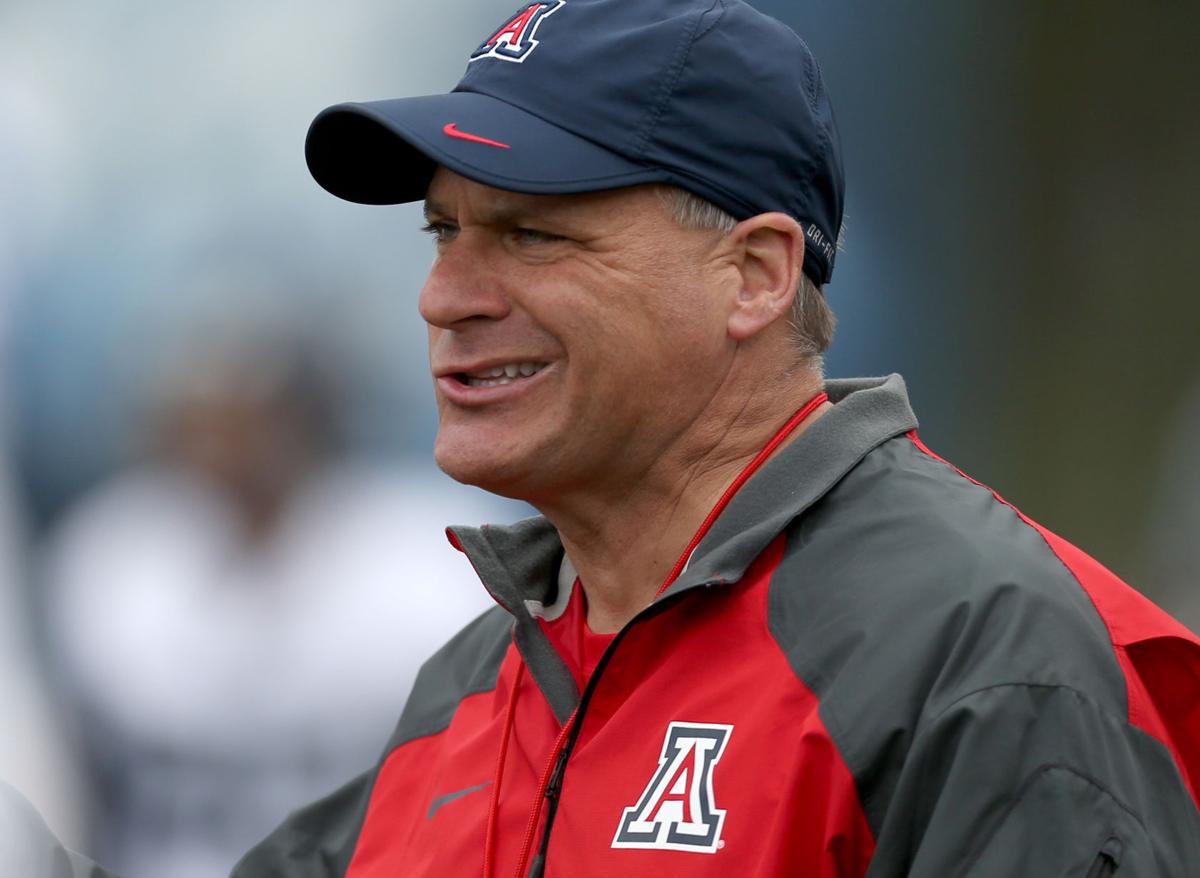Arizona Wildcats coach Rich Rodriguez isn’t the most popular man in Tucson these days. Such is life coming off a 3-9 season.
But you can’t deny that Rodriguez cares deeply about the sport of college football and his colleagues in the coaching profession. He is the acting president of the American Football Coaches Association, and he’s constantly pushing for positive change in matters that affect coaches and players.
Rodriguez recently commented on the many NCAA rule changes taking effect in college football this year and next. Although he was intimately involved in the discussions that led to their formation, Rodriguez didn’t necessarily like all of the outcomes. Here are his thoughts:
Change: Early signing day. Recruits now can sign letters of intent in late December. This year, the window will be Dec. 20-23.
Rodriguez: “December’s better than February, but it doesn’t solve the problems. I still think it makes more sense to have no signing day. I was one that voted against the December one, because I think there should be none.”
Change: New period for official visits, starting April 1 of a student-athlete’s junior year and ending in late June.
Rodriguez: “Right now, you’re allowed 56 official visits. We only use 36. So we save the school money. You kind of zero in on the guys you know (will come) by the time the official visits come. Now everybody’s going to use 56, because it's so early in the process. So it’s going to cost schools more money.
“The life of an assistant and the work that they do now is already pretty hectic. Which is OK; they get paid well. But to have official visits in those months is way too much to ask for kids, coaches and schools. I think it’s a bad idea.”
Change: The abolition of two-a-day practices during training camp.
Rodriguez: “Not a big deal. You don’t try grind guys (anymore). The difference nowadays is kids work out all summer. Maybe you could only have a couple (two-a-days). But leave it up to the discretion of the coach.
“If your coach is going grind his team into the ground, well, shame on him. I think most coaches nowadays have adopted that - not hitting, not going full pads every day, limiting the two-a-days. If you’re going to have two-a-days, one of them is just going to be a light practice. That’s what we do. We had what, three two-a-days last year? But we never had two hard ones in the same day. It was a light, easier practice, and then a hard one.
“To enforce that rule is almost saying, hey, you don’t know how to get a team ready and in shape without beating them up. I think coaches are smarter these days as far as that goes.”
Change: Addition of a 10th full-time, on-field assistant coach for FBS schools (effective Jan. 9, 2018).
Rodriguez: “They should’ve added it right away. They’re afraid to add it and disrupt programs. Well, there’s always going to be disruptions. Why not hire guys now – between now and July – and get them acclimated? I’m glad it passed, but I think it should have been effective right away.”
Change: Similar to basketball, FBS schools no longer can hire “people close to a prospective student-athlete” for a two-year period before and after enrollment.
Rodriguez: “Conceptually, I understand why they did it. But to me, I’m a coach; I’m a member of a coaches’ organization. I don’t know why we’d pass or be in favor of anything that limits opportunities, whether it’s high school coaches or young coaches.
“If they say an individual associated with a prospect, does that mean you can’t hire a personnel guy from another college team because he’s recruited guys or has an association with them? There’s a lot of unintended consequences, and I think it punishes high school coaches that do a good job of building programs and having Division I players.
“I think the intent to clean up some of the BS was good, but I think they went about it the wrong way.”
Change: Alterations to summer-camp protocols. They’re limited to 10 days and must take place on campus or at “facilities regularly used by the school for practice or competition.” Also, coaches are allowed to have recruiting conversations with prospects.
Rodriguez: “They were being used for recruiting before, so there’s really nothing different. Actually, one of my ideas was to limit it to 10 days. That’s better. I think camps, where they are now, are in a pretty good spot.
“Nobody did satellite camps to ‘spread the wealth of knowledge of football.’ Let’s not be hypocritical. You did it because you wanted to recruit.”





